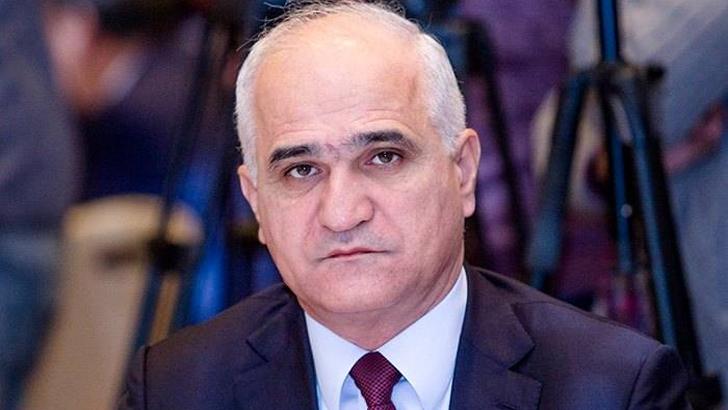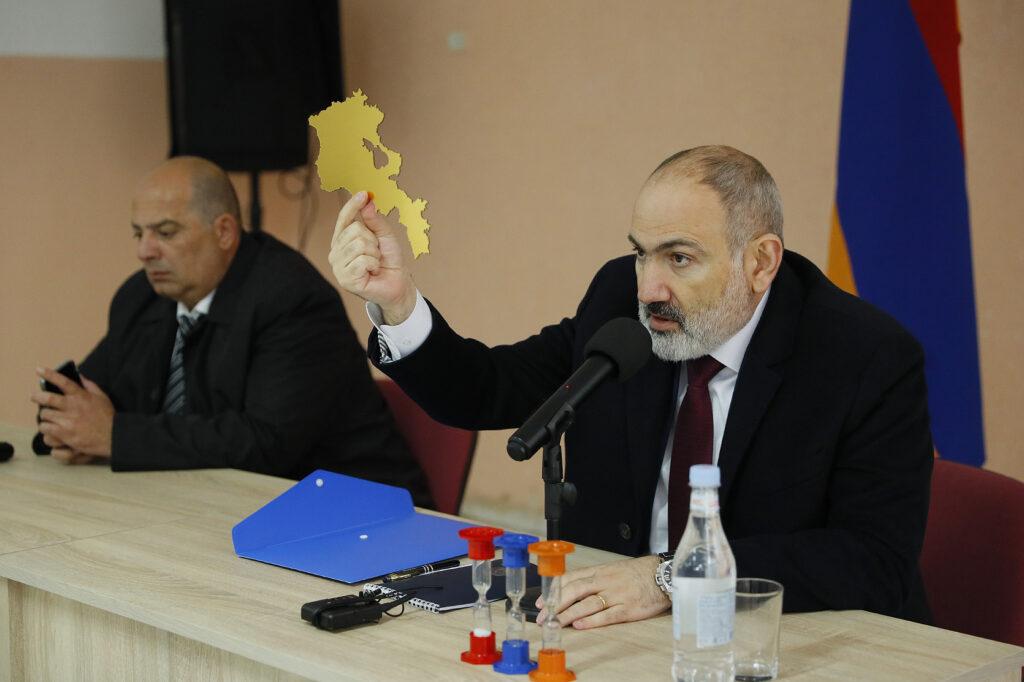Analyzing the Armenian-Azerbaijani border talks
Delimitation dilemma
ANALYTICS 21 March 2024 - 09:14
| Fuad Muxtar-Agbabali |
Armenian Prime Minister Nikol Pashinyan's recent announcement to initiate the delimitation and demarcation of the border with Azerbaijan signals a significant turning point in the post-war dynamics of the South Caucasus region.
This move, aimed at averting further conflict and establishing clear territorial boundaries, carries immense importance against the backdrop of the recent Karabakh conflict that has plagued the region for decades.
However, while the prospect of peace is met with optimism, complexities and challenges abound, stirring concerns among the two neighboring nations and stakeholders. The primary motivation behind the border delimitation and demarcation, as articulated by Prime Minister Pashinyan, is the imperative to prevent a recurrence of hostilities between Yerevan and Baku.
In view of the history of conflicts and the recent escalation resulting in Azerbaijan's reclamation of territories in and around Karabakh, establishing a clear and mutually recognized border becomes paramount for the regional stability and peace. Yet, this process is not without its obstacles, as evidenced by the contentious issue of territorial control over specific villages.
Baku calls for the return of villages
Amidst ongoing negotiations and tensions between Armenia and Azerbaijan, Baku has issued a demand for the return of four villages situated within Azerbaijan's Qazax District that fell under Armenian control during the aggression of 1990s.

The announcement, made through the office of Azerbaijani Deputy Prime Minister Shahin Mustafayev on March 9, 2024, underscores the persistent complexities surrounding border disputes.
The statement asserts that the villages of Baganis Ayrim, Asagi Askipara, Xeyrimli, and Qizilhacili unequivocally belong to Azerbaijan and must be promptly liberated. Additionally, it suggests that the resolution of the remaining four Azerbaijani exclave villages currently under Armenian control - Yuxari Askipara, Sofulu, Barxudarli, and Karki in Nakhchivan - will be addressed within the broader framework of the ongoing border delimitation process between the two countries.
Armenia’s concerns & controversies
Azerbaijan's insistence on the transfer of four villages near the Tavush region has sparked apprehension and resistance among Armenian political establishment and locals along the border.

The prospect of ceding these villages to Azerbaijan raises concerns about the livelihoods and security of those residing in the affected areas. The fear of being surrounded by Azerbaijani territories, potentially leading to isolation and heightened vulnerability, underscores the intricate dynamics at play in the border negotiations.
Furthermore, the reported preparedness of certain villagers to employ road blockades and self-defense tactics serves as a stark reminder of the profound sentiments and concerns permeating local communities. It underscores the gravity of the situation and emphasizes that no nation can afford to disregard the occupation of its own lands.
Armenia's assertion of territorial claims, compounded by the three-decade-long occupation of Azerbaijani lands, stems from historical, ethnic, and territorial disputes. This protracted conflict significantly complicates the process of border delimitation. The intricate demographic makeup of the region, characterized by intertwined Armenian and Azerbaijani communities, further adds layers of complexity to the task of delineating borders.
In conclusion, while the initiation of border delimitation between Armenia and Azerbaijan signifies a positive step towards resolving long-standing disputes and ensuring peace in the South Caucasus, the path ahead is fraught with challenges.
In a joint press conference with NATO Secretary General Jens Stoltenberg in Yerevan, Armenian Prime Minister Nikol Pashinyan underscored the imperative for unwavering international support, including from NATO, for the peace process between Armenia and Azerbaijan. Pashinyan's call for support was grounded in a framework of established and mutually agreed-upon principles aimed at fostering stability and peace in the South Caucasus.
Central to Pashinyan's address were the three principles agreed upon at the highest level, emphasizing the recognition of each other's territorial integrity based on the Alma-Ata Declaration. This declaration, harking back to the dissolution of the Soviet Union in 1991, outlines the parameters for the delimitation of the Armenia-Azerbaijan interstate border, seeking to restore the border as it existed at the time.
Additionally, Pashinyan highlighted the importance of unblocking regional infrastructures, respecting the sovereignty and jurisdiction of the countries they traverse, underpinned by principles of equality and reciprocity. The presentation of the Crossroads of Peace project encapsulated Armenia's vision for addressing regional infrastructural concerns.
Pashinyan's plea for international support extended to a resolute rejection of coercive tactics and threats, emphasizing the necessity for a constructive and peaceful resolution to the longstanding conflict.
Amidst mounting tensions and uncertainty, Armenian Prime Minister Nikol Pashinyan's recent visit to Tavush has stirred controversy and unease in society, according to the local media, some claiming that Pashinyan's statements during the visit, particularly regarding the initiation of border delimitation in Tavush, have triggered concerns in government corridors.
Despite assurances from Armenian leadership that there would be no further concessions to Azerbaijan, Pashinyan's remarks have fuelled concerns among locals and participants in the meeting with Pashinyan purportedly revealed that his warnings of a new war if concessions were not made left them feeling unsettled and even disdainful towards the prime minister.
Behind closed doors, Pashinyan allegedly urged his colleagues to engage with the public and explain the necessity of border demarcation, hinting at the possibility of handing Azerbaijani villages over to the real owners. Speculations are rife around that Pashinyan's visit to Tavush was designed to instill fear and pressure residents into accepting further concessions under the threat of conflict. The notion that Armenia's military capabilities are insufficient to resist a war further exacerbated concerns among locals, prompting fears of an imminent security crisis.
Armenia’s opposition and pro-opposition media accuse the Armenian leadership of adopting rhetoric reminiscent of Azerbaijan's propaganda, painting a bleak picture of Armenia's ability to resist territorial encroachment.
By allegedly echoing Azerbaijan’s arguments, the government is accused of undermining national dignity and identity, prioritizing short-term political stability over long-term strategic interests. It argues that such a strategy may temporarily placate citizens or shore up political support but ultimately undermines the integrity of the state.
Conclusion
While the initiation of border delimitation signifies a positive step towards resolving long-standing disputes and ensuring peace in the South Caucasus, the path ahead is fraught with challenges.
Diplomatic efforts must be redoubled to foster dialogue and cooperation between Armenia and Azerbaijan. Only through sustained engagement and a commitment to peaceful resolution can the longstanding disputes over border territories be effectively addressed, paving the way for stability and prosperity in the region.
Caliber.Az
|
1
|
High time to declare US ambassador persona non grata Mr. Libby, take your suitcase and leave for Washington
05 May 2024 - 12:06
|
|
2
|
Sports & Lake Urmia as tools in fighting for Azerbaijani national identity in Iran Identity struggles: Sports & environment
07 May 2024 - 16:46
|
|
3
|
West destabilising situation in Georgia Security, impunity for (foreign) agents
05 May 2024 - 17:28
|
|
4
|
Double standards and Michel's confession Europe's hypocrisy
05 May 2024 - 11:18
|
|
5
|
Armenian priests peddling false narratives Unmasking revanchist rhetoric
05 May 2024 - 14:57
|
Paris Olympics 2024: Bedbugs, QR codes and Macron's unkept promises
Challenges behind celebration08 May 2024 - 11:13
UN World Food Program to seek funds to scale up humanitarian aid in Somalia
08 May 2024 - 10:58
Azerbaijani PM meets with Turkish parliamentarian Fuat Oktay
08 May 2024 - 10:52
"Azerbaijan and Kenya join forces ahead of COP29"
Article by Ambassador Sultan Hajiyev08 May 2024 - 10:45
Abandon the doom and gloom narrative around Azerbaijan and Armenia
Article by The Guardian08 May 2024 - 10:31
Armenian Apostolic Church: Sowing seeds of hatred instead of cultivating peace
Will Yerevan opt to cling to historical myths?08 May 2024 - 10:18
Russian hacker sanctioned by UK, US, Australia
08 May 2024 - 10:04
Poland urges EU for joint defence against Russian missiles
08 May 2024 - 09:52
Earthquake hits Armenian-Azerbaijani border
08 May 2024 - 09:40
UN trains Azerbaijani officials for Enhanced Climate Transparency Reporting
Ahead of COP29/PHOTO08 May 2024 - 09:27
Damage to Ukraine's energy infrastructure estimated at over $1 billion
08 May 2024 - 09:14
Elbit’s new Red Sky air defence system goes public with first customer
08 May 2024 - 09:00
China, Russia to fill vacuum of US military withdrawal from Niger
Analysis by Army Technology08 May 2024 - 07:21
Finland stores equipment in Norway, spurred by Russia’s range
New NATO trick08 May 2024 - 05:24
US seeks to curb Iran’s fundraising capacity in Southeast Asia
08 May 2024 - 03:18
Germany sends two warships to Indo-Pacific amid China and Taiwan tensions
08 May 2024 - 01:20
US says Israel committed to reopening Kerem Shalom crossing on May 8
07 May 2024 - 23:23
NATO special rep meets Armenian diplomat to mull cooperation & regional dynamics
07 May 2024 - 21:31
Baku hosts 7th high-level working group meeting on Caspian Sea issues
PHOTO07 May 2024 - 21:10
Uzbek president to pay working visit to Moscow on May 8-9
07 May 2024 - 20:59
US FAA opens probe into Boeing 787 inspections
07 May 2024 - 20:47
Iraqi Kurdistan not to be a center to threaten Iran security
07 May 2024 - 20:32
FIFA president invited to COP29
PHOTO07 May 2024 - 20:25
Pakistani delegation visits Azerbaijan National Defence University
PHOTO07 May 2024 - 20:14
Azerbaijan chairs BSEC meeting on tourism cooperation, focuses on regional development
07 May 2024 - 20:07
Azerbaijani migration service detains 785 foreigners in crackdown on illegal migration
07 May 2024 - 19:53
Gunfire breaks out on Kyrgyz-Tajik border
07 May 2024 - 19:35
Azerbaijani PM visits monument to national leader Heydar Aliyev in Ankara
PHOTO07 May 2024 - 19:25
Guterres urges Israel, Hamas "to show political courage" and secure ceasefire
07 May 2024 - 19:17
Israeli forces conclude operation in Tulkarem
VIDEO07 May 2024 - 18:50
Slovak premier wraps up visit to Azerbaijan
07 May 2024 - 18:38
Belarus conducts tactical nuclear inspection together with Russia
07 May 2024 - 18:26
Poland calls on EU to build joint air-defence system
07 May 2024 - 18:14
French MFA summons Russian ambassador over misuse of diplomatic channels
07 May 2024 - 18:02
Prime Minister Ali Asadov visits Anitkabir mausoleum in Ankara
PHOTO07 May 2024 - 17:59
Ukraine exposes network of Russian agents plotting assassination of president Zelenskyy
PHOTO07 May 2024 - 17:50
Russia reserves right to target British military sites
MFA spox warns07 May 2024 - 17:39
Armenian PM alleges Catholicos leads political movement
Favoring ex-president Kocharyan's interests07 May 2024 - 17:27
President Aliyev holds expanded meeting with Slovak PM
PHOTO07 May 2024 - 17:15
Armenia's Pashinyan affirms commitment to peace talks despite mediator ineffectiveness
07 May 2024 - 17:03
